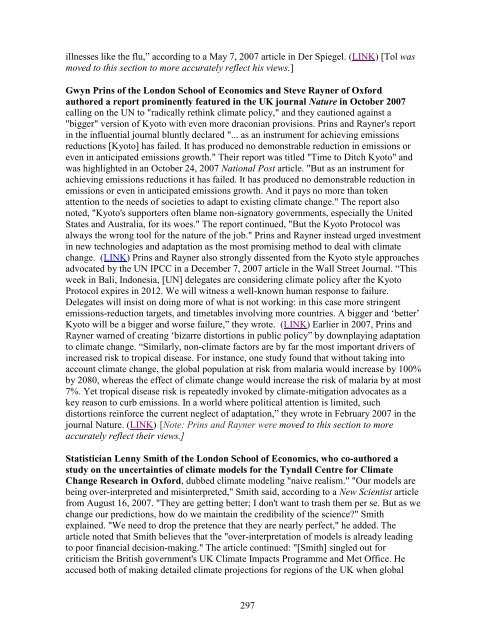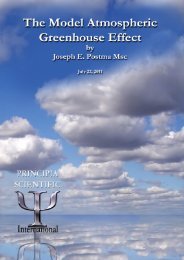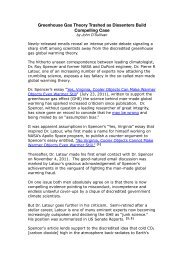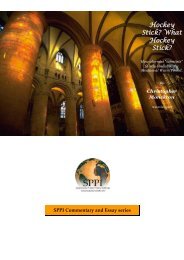Than 1000 International Scientists Dissent Over Man-Made Global ...
Than 1000 International Scientists Dissent Over Man-Made Global ...
Than 1000 International Scientists Dissent Over Man-Made Global ...
You also want an ePaper? Increase the reach of your titles
YUMPU automatically turns print PDFs into web optimized ePapers that Google loves.
illnesses like the flu,‖ according to a May 7, 2007 article in Der Spiegel. (LINK) [Tol was<br />
moved to this section to more accurately reflect his views.]<br />
Gwyn Prins of the London School of Economics and Steve Rayner of Oxford<br />
authored a report prominently featured in the UK journal Nature in October 2007<br />
calling on the UN to "radically rethink climate policy," and they cautioned against a<br />
"bigger" version of Kyoto with even more draconian provisions. Prins and Rayner's report<br />
in the influential journal bluntly declared "... as an instrument for achieving emissions<br />
reductions [Kyoto] has failed. It has produced no demonstrable reduction in emissions or<br />
even in anticipated emissions growth." Their report was titled "Time to Ditch Kyoto" and<br />
was highlighted in an October 24, 2007 National Post article. "But as an instrument for<br />
achieving emissions reductions it has failed. It has produced no demonstrable reduction in<br />
emissions or even in anticipated emissions growth. And it pays no more than token<br />
attention to the needs of societies to adapt to existing climate change." The report also<br />
noted, "Kyoto's supporters often blame non-signatory governments, especially the United<br />
States and Australia, for its woes." The report continued, "But the Kyoto Protocol was<br />
always the wrong tool for the nature of the job." Prins and Rayner instead urged investment<br />
in new technologies and adaptation as the most promising method to deal with climate<br />
change. (LINK) Prins and Rayner also strongly dissented from the Kyoto style approaches<br />
advocated by the UN IPCC in a December 7, 2007 article in the Wall Street Journal. ―This<br />
week in Bali, Indonesia, [UN] delegates are considering climate policy after the Kyoto<br />
Protocol expires in 2012. We will witness a well-known human response to failure.<br />
Delegates will insist on doing more of what is not working: in this case more stringent<br />
emissions-reduction targets, and timetables involving more countries. A bigger and ‗better‘<br />
Kyoto will be a bigger and worse failure,‖ they wrote. (LINK) Earlier in 2007, Prins and<br />
Rayner warned of creating ‗bizarre distortions in public policy‖ by downplaying adaptation<br />
to climate change. ―Similarly, non-climate factors are by far the most important drivers of<br />
increased risk to tropical disease. For instance, one study found that without taking into<br />
account climate change, the global population at risk from malaria would increase by 100%<br />
by 2080, whereas the effect of climate change would increase the risk of malaria by at most<br />
7%. Yet tropical disease risk is repeatedly invoked by climate-mitigation advocates as a<br />
key reason to curb emissions. In a world where political attention is limited, such<br />
distortions reinforce the current neglect of adaptation,‖ they wrote in February 2007 in the<br />
journal Nature. (LINK) [Note: Prins and Rayner were moved to this section to more<br />
accurately reflect their views.]<br />
Statistician Lenny Smith of the London School of Economics, who co-authored a<br />
study on the uncertainties of climate models for the Tyndall Centre for Climate<br />
Change Research in Oxford, dubbed climate modeling "naive realism." "Our models are<br />
being over-interpreted and misinterpreted," Smith said, according to a New Scientist article<br />
from August 16, 2007. "They are getting better; I don't want to trash them per se. But as we<br />
change our predictions, how do we maintain the credibility of the science?" Smith<br />
explained. "We need to drop the pretence that they are nearly perfect," he added. The<br />
article noted that Smith believes that the "over-interpretation of models is already leading<br />
to poor financial decision-making." The article continued: "[Smith] singled out for<br />
criticism the British government's UK Climate Impacts Programme and Met Office. He<br />
accused both of making detailed climate projections for regions of the UK when global<br />
297





